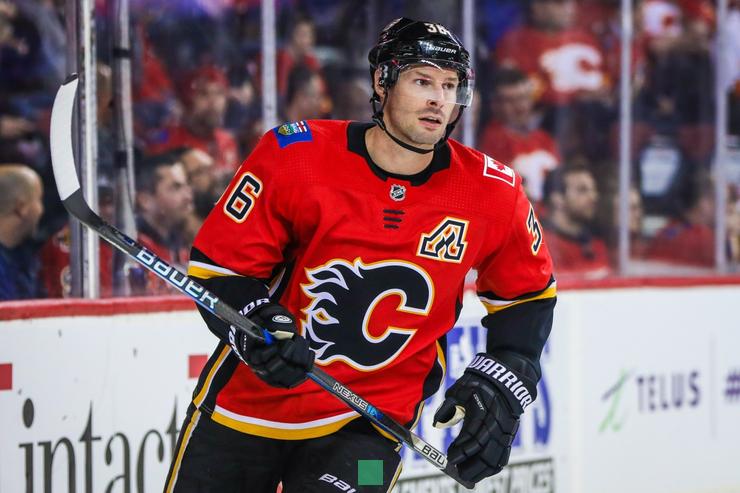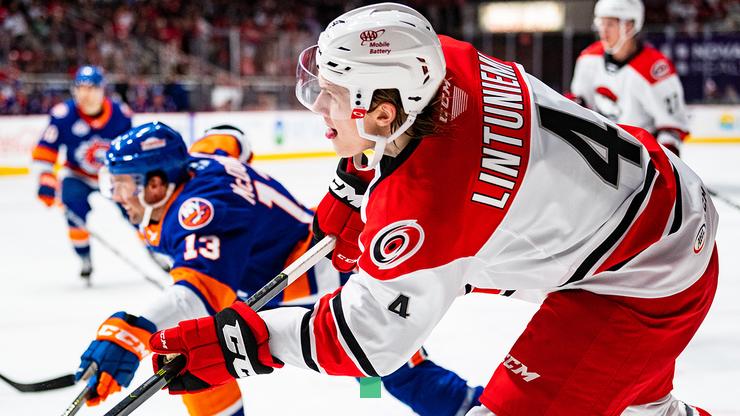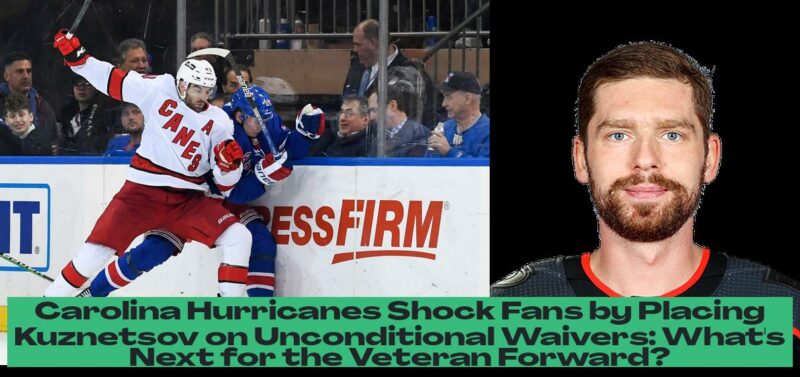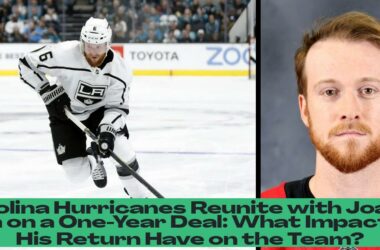Canes Part Ways with Kuznetsov: A Look at the Unconditional Waivers

The Carolina Hurricanes, in a surprising move, placed forward Evgeny Kuznetsov on unconditional waivers, essentially setting the stage for a contract termination. This decision has sent shockwaves through the hockey world, leaving fans and analysts alike questioning the move and wondering what it means for both the player and the team.
Kuznetsov, a seasoned NHL veteran known for his offensive prowess and playmaking abilities, arrived in Raleigh on March 8th, 2024, in a trade with the Washington Capitals. The Canes acquired him in exchange for a third-round pick in the 2025 NHL draft, with Washington retaining 50% of his salary. This was seen as a shrewd move by the Canes, adding a proven scorer to their already potent lineup in the hopes of a deep playoff run.
However, Kuznetsov’s time in Carolina was marked by inconsistency. While he did contribute with seven points (two goals and five assists) in 20 regular season games, he struggled to find his footing in the Canes’ system. His performance in the 2024 Stanley Cup Playoffs, where he tallied six points (four goals and two assists) in 10 games, offered a glimpse of his potential but ultimately wasn’t enough to solidify his spot with the team.
The Canes’ decision to place Kuznetsov on unconditional waivers, leading to a potential contract termination, was a tough call. It signals a change in direction for the franchise, as they look to solidify their roster and build for the future. The move comes with a price, as the Canes will be responsible for the remaining year of Kuznetsov’s contract, carrying an average annual value (AAV) of $3.9M after Washington retained half of his salary.
It’s important to note that placing a player on unconditional waivers is not a common practice in the NHL. It’s usually done as a last resort, often when a player is facing a suspension or when a team wants to terminate a contract. In Kuznetsov’s case, it’s likely that the Canes and the player mutually agreed that this was the best course of action for both parties.
- The Carolina Hurricanes placed forward Evgeny Kuznetsov on unconditional waivers, signaling a potential contract termination.
- Kuznetsov’s time in Carolina was marked by inconsistency despite showing glimpses of his offensive abilities.
- The decision to part ways with Kuznetsov reflects the Canes’ commitment to solidifying their roster and building for the future.
- Placing a player on unconditional waivers is a rare move in the NHL, usually reserved for extreme circumstances like contract termination.
- The Canes will be responsible for the remaining year of Kuznetsov’s contract, with an average annual value of $3.9M after Washington retained half of his salary.
- This move signifies a significant shift for both the player and the team, prompting speculation and discussion within the hockey community.
Why Did the Hurricanes Place Kuznetsov on Unconditional Waivers?
The Carolina Hurricanes’ decision to place Evgeny Kuznetsov on unconditional waivers for the purpose of contract termination wasn’t a knee-jerk reaction. It was a calculated move driven by several factors.
Firstly, Kuznetsov’s performance with the Canes didn’t live up to expectations. While he showcased flashes of brilliance, his overall impact was inconsistent, failing to integrate seamlessly into the team’s dynamic. His lack of consistency, coupled with his hefty contract, made it challenging for the Canes to justify keeping him on the roster.
Secondly, the Hurricanes are looking to build a sustainable and competitive team for the long term. Placing Kuznetsov on waivers allows them to free up cap space and create flexibility in their roster construction. This move enables them to pursue other players who might better fit their long-term plans and playing style.
Thirdly, the Canes are likely looking to make a statement about their commitment to team culture. The decision to part ways with Kuznetsov, despite his talent and experience, sends a clear message that the team is prioritizing chemistry, discipline, and commitment to the system over individual star power. This shift in approach could potentially attract young, hungry players who are eager to embrace the Canes’ vision.
In essence, the Canes decision to place Kuznetsov on unconditional waivers is part of a larger strategy to reshape their roster, manage their cap situation, and solidify their core values. It’s a bold move that signifies their ambition to be a consistent contender for the Stanley Cup.
What’s Next for Kuznetsov?

With the Canes placing him on unconditional waivers, Evgeny Kuznetsov’s immediate future in the NHL remains uncertain. The 32-year-old forward is now a free agent, with the possibility of signing with another team. However, his recent performance and the circumstances surrounding his departure from Carolina might raise eyebrows among potential suitors.
Some teams might be hesitant to take on a player with a hefty contract and a recent history of inconsistency. Others, however, might see this as an opportunity to acquire a talented player at a discounted price. If Kuznetsov is willing to accept a more modest contract and prove himself in a new environment, he could find a new home in the league.
Alternatively, Kuznetsov could explore options in international leagues. His experience and talent make him a valuable asset in Europe, and he might be able to secure a lucrative deal with a team in Russia, KHL, or another European league. This could be a fresh start for Kuznetsov, allowing him to regain his confidence and rediscover his passion for the game.
Ultimately, Kuznetsov’s next move depends on his own aspirations and the opportunities that arise. He has the talent and experience to succeed in the NHL or elsewhere, but he will need to adapt to the new realities of his situation and prove himself once again.
A Look Back at Kuznetsov’s NHL Journey
Evgeny Kuznetsov’s NHL career has been a rollercoaster ride, marked by moments of brilliance, personal struggles, and ultimately a bittersweet end with the Carolina Hurricanes. The Chelyabinsk, Russia native, drafted 26th overall in 2010 by the Washington Capitals, quickly established himself as a skilled playmaker and offensive threat.
He played a key role in the Capitals’ 2018 Stanley Cup championship, scoring the game-tying goal in the third period of Game 5. He also earned the Conn Smythe Trophy as the playoff MVP, highlighting his contributions to the Capitals’ historic victory. Kuznetsov’s talent and leadership earned him a long-term contract, solidifying his role as a cornerstone of the Capitals’ franchise.
However, Kuznetsov’s time in Washington was not without its challenges. He faced criticism for his on-ice performance and off-ice behavior. He was suspended for two games in 2019 for violating the NHL’s Substance Abuse Program, and his actions drew scrutiny from fans and media alike. Despite these setbacks, Kuznetsov remained a valuable player for the Capitals, contributing consistently to their offensive success.
His trade to the Carolina Hurricanes in 2024, a move that seemed to breathe new life into his career, turned out to be short-lived. The Canes’ decision to place him on unconditional waivers underscores the complexities of his career and highlights the challenges of adapting to a new team and environment. While his time in Carolina was brief, Kuznetsov’s contributions to the team and his impact on the NHL landscape will be remembered.
The Unconditional Waivers: A Look at the Impact
The Carolina Hurricanes’ decision to place Evgeny Kuznetsov on unconditional waivers has sparked discussions about the impact of this move on the NHL landscape. This transaction, while seemingly routine, raises several important questions about the future of the league and the dynamics between players, teams, and the salary cap.
Firstly, the increasing use of unconditional waivers to terminate contracts suggests a growing trend of teams prioritizing cap flexibility and long-term sustainability over individual talent. This approach, while financially responsible, could lead to a more transactional approach to player acquisition and retention. It could also create a climate of uncertainty for players, as contracts become less secure and teams are more willing to move on from players they once valued.
Secondly, the situation highlights the challenge of managing high-profile players with large contracts. The Canes’ decision to part ways with Kuznetsov, despite his talent and experience, is a reminder that even established players can become expendable if their performance doesn’t align with the team’s goals and financial constraints.
Thirdly, the unconditional waivers process itself has drawn criticism for its lack of transparency and fairness. The ability of teams to terminate contracts without allowing other teams to claim players raises concerns about the potential for teams to manipulate the system and exploit loopholes. This lack of accountability could lead to unfair outcomes for players who are caught in the crossfire of contractual disputes.
The Hurricanes’ move to place Kuznetsov on unconditional waivers is a significant development in the NHL landscape, raising questions about the future of the league and the evolving dynamics between players, teams, and the salary cap. As the league continues to evolve, it’s important to monitor these trends and ensure that the rules and regulations in place are fair and transparent for all parties involved.









